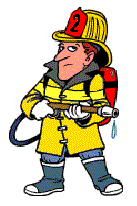
News
Qualified firefighters or just volunteers?
WEB EXCLUSIVE
Qualified firefighters or just volunteers?

The hazmat technician squinted through the blizzard and sized up my crew. “Are you qualified firefighters, or are you just volunteers?” he asked. Read more in Tim Beebe's Spontaneous Combustion column.
April 30, 2008
By Tim Beebe
Tim Beebe, the fire chief in Upsala, Ont., looks at the lighter side of firefighting in his Spontaneous Combustion column.

April 30, 2008
The hazmat technician squinted through the blizzard and sized up my crew. “Are you qualified firefighters, or are you just volunteers?” he asked.
With a quick glance over my shoulder I said, “We’re qualified volunteers.” It was a defensive, smart-aleck response, but at least he was spared a black eye from one of my captains.
Qualified volunteers? In retrospect, it was a bold claim under the circumstances. There were 20 rail cars in tangled heaps, some of them burning. A truck driver was dead. A propane tanker had exploded before we arrived, sending a ball of fire into the night sky. The technician, though lacking in etiquette, only wanted to know if we could do the job, which was to protect six stranded cars of styrene monomer. I was green, but hey, I had a truck full of water and a crew that could pull hose, so what other qualifications did I need?
That’s a good question. I should ask it more often. I’ve been to hazmats since then where I knew my qualifications didn’t extend past the end of my binoculars. Other times, like at a galloping crown fire last year, I was only qualified to monitor the flanks until MNR arrived. But these should be no-brainers. No one likes to wade through liquid hydrogen, or get fricasseed.
On the other hand, when the neighbor’s house catches fire, we can be more inclined to push the limits too far. Maybe it’s because we like the neighbors, and we know they really like their home. Maybe it’s because we think we should be able to fight any fire from the inside out. Or maybe we just hate standing on the sidelines while the main attraction burns.
I heard a saying that all new recruits are given a full bag of luck. They also receive an empty bag, which they must fill with experience. To survive, they must fill the empty bag before the full bag runs out. The problem is, for some the bag of luck runs out faster than for others.
Incidentally, one of my first priorities with new recruits is to stamp out all reliance on luck – or worse, invincibility. Occasionally a firefighter suffers from Superman Syndrome, but it usually doesn’t take long to find out that our world is much darker than Superman’s.
I’m not a defeatist. We do need to know when we are qualified for the job of the day. But we must know when we aren’t. Being qualified is as much about resources as it is about training. Do we have enough people on the scene for what we are attempting? Is the pumper our only water supply at the moment? What will we actually gain by going in?
Rumor has it that one big-city department in Ontario can put enough people on a fire to stomp it out with their boots. They don’t even need water. That’s probably an urban legend, but we all know that urban and rural resources can be as different from each other as aerial towers are from pack pumps. When it’s decision time, and our people’s lives are in our hands, we need to remember that.
So what happened on that dark, snowy night by the railroad tracks those many years ago? After smoothing out our ruffled feathers, we kept an all-night vigil over six cars of styrene. Yes, we did hate to watch those other railcars burn in the distance. But the hazmat technician had one thing right: we didn’t need to go out there and save anything. Did we convince him that we were “qualified volunteers?” I don’t know. I do know that, like it or not, we were (and still are) the only fire department within a hundred kilometres in any direction.
I also know that, hazmat or house fire, I had better be qualified to bring all of my people safely home at the end of the day.
Good judgment comes from experience. Good experience comes from someone else’s bad judgment. – Author unknown
Print this page